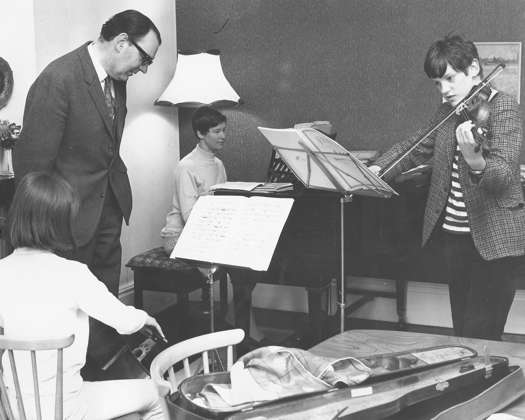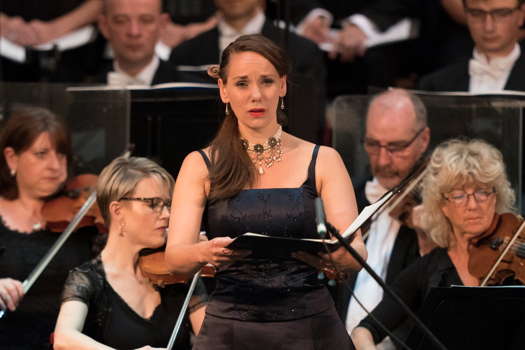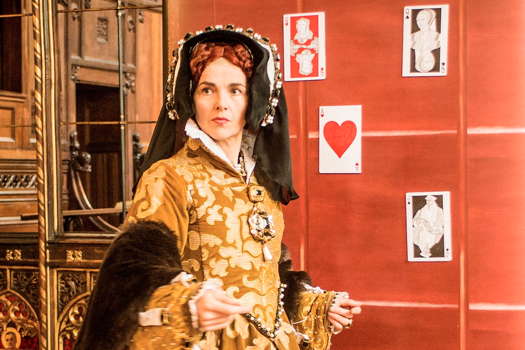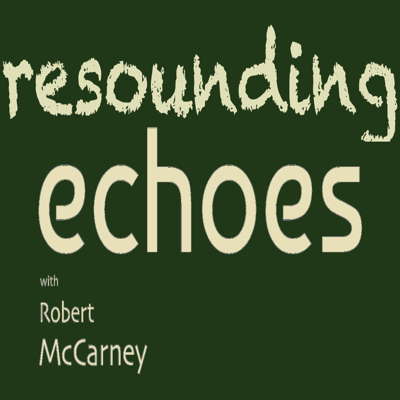- Franz Beck
- Alexander Toradze
- Long Beach Opera
- high definition
- Arthaus
- Fartein Valen
- Maria Grazia Schiavo
- Orchestra of the Royal Opera House
Packed With Good Things
RODERIC DUNNETT reports from the
2019 Three Choirs Festival in Gloucester
The death of John Joubert in January this year, aged ninety-one, in a Birmingham hospital following an unfortunate fall, robbed British music of one of its most wise, admirable and indeed productive composers. Since arriving in the UK from South Africa on a scholarship in 1946, aged nineteen, Joubert has, as well as lecturing at Hull (where he took over Philip Larkin's house) and being teacher of composition then Reader in Music at Birmingham University, produced a large amount of music in all the obvious genres, including opera, chamber music - his 'miniature' String Quartet made an appearance this year; he has in fact composed three more - symphonies and concertos, and a host of extended choral pieces to sacred or secular texts - or a mix. His opera Under Western Eyes (1968), has, while he lived, cried out for performance by one of the major companies. His three-act Silas Marner, a marginally earlier treatment (1961) of George Eliot, sounds an intriguing work whose score might be well worth unearthing. Jane Eyre received its formal premiere in 2016 and emerged as a superbly crafted score, with April Fredrick and David Stout (as Jane and Rochester) proving with passion and tenderness the superb best qualities of this, Joubert's last opera.

John Joubert with his wife Mary at the piano, his daughter Anna playing cello and his son Pierre on violin at the family home in Moseley, Birmingham, UK
Deliberately counteracting this general neglect, it has been Adrian Partington's long-held wish to return to Joubert's An English Requiem, which he had premiered at Gloucester in 2013. Joubert himself supplied a note here, in which he indicates that its six sections are a progress from 'the earliest premonition of death to its ultimate inevitability'. And indeed this is so. The first movement, prefixed by a moody orchestral sequence, is dark and gloomy: haunting, the very opposite of optimism. Above all, its impact was generated by Partington's daringly restrained, passive first movement adagio. The choir entered at a likewise bleak slow speed, with aching flute and oboe, which extends to Brahms' text 'The days of mortals are as grass'. Bass clarinet supplied an entrance to the baritone's 'Lord, let me know mine end ...', so memorably set by Maurice Greene, engaging words also deployed by Brahms: here, an expressive horn solo accompanying the baritone solo - the magnificent Neal Davies - is followed by a welter of woodwind, yielding - aptly - overwhelming intensity, confirmed by the chorus in a passage perhaps akin, forcefully, to a Dies Irae.
Joubert well knew the value of dwelling on repetition, by way of meditation, in such works, hence the moving ending (again with horn), 'before I depart and am no more'. Indeed repetitions are a salient feature in Part 3, drawn from some five sources, largely psalms, opening into a measure of fugal writing, all admirably supplied by the BBC National Orchestra of Wales, taking the platform for just one night. April Fredrick, also the soprano soloist here, sang with heart-piercing purity - indeed her first line was 'My heart is pierced within me'. Pure, intense, exquisite, meltingly beautiful would not overstate the moving delicacy and charm of her voice in this movement, 'Hope', several times reaching - resolutely - into high tessitura. Partington's accompaniment matched her perfectly, never overbearing the voice but ideally controlling and restraining Joubert's quite strong yet refined textures.

April Fredrick, the exalted soprano soloist in Joubert's An English Requiem. Photo © 2019 Michael Whitefoot
For the next chorus, 'Faith', Joubert produces delicate filigree from piccolo, cor anglais, and also bass clarinet. The choir becomes animated - well-tuned high tenors arching upwards most vividly - and a long fugue emerges, in effect a sort of double or sequential fugue, the one succeeding the other, in a passage from St John, following Romans, Lamentations, and Job. But it is Revelation that brings up the conclusion, again with baritone then the soprano (plus delicate following oboe and violin solo): 'There will be no more death ... no more mourning nor sadness' (or 'sorrow nor sighing': the texts here are culled from the Revised Standard edition). Joubert's writing is never simplistic: to prise out so good a performance here required hard rehearsal (before this week) for all three choral societies and lucid, astute leadership in final rehearsal and on the night from the conductor. Even the orchestra faced plenty of chordal and contrapuntal challenges.
It was a pity, perhaps tragic, that the composer could not survive to hear so committed and intensely expressive a performance of this extended work, surely rightly adjudged, on the basis of this pretty spectacular showing, one of his best choral undertakings. Natalie Clein, who must play the work every other day, gave an invariably beautiful though visually slightly offputting (Steven Isserlis-like) performance of Elgar's Cello Concerto; and loyal to Berlioz, Partington allowed the Frenchman to pop up again with his overture Le Carnaval Romain: opening with zest, a beautiful oboe solo, with dance and high jinks to follow: great fun.
The late night concerts continued unabated. One of the most significant, and original, was Mary's Hand, a vivid new work by Martin Bussey, composer and scholar, set for a mezzo soloist and three instrumentalists - oboe/cor anglais, trumpet and cello. It is classed as a new opera. Mezzo Clare McCaldin, who has promoted this historical event and takes the role of the hapless queen, was a choral scholar at Clare College, Cambridge and coincidentally has both recorded the role of Mrs Fairfax in Joubert's Jane Eyre (on Somm) and espoused - also on disc - the music of Stephen McNeff, composer of the mesmerising score for The Burning Boy (at Tewkesbury, first weekend). Bussey is one of the outstanding educational choral and vocal teachers currently working in the UK, having honed his very considerable talents as a choral scholar at King's College, Cambridge, and as a pupil of none other than the great baritone John Carol Case.
This delicately engineered show and score, some seventy minutes long, is brought further alive by a graceful, intelligent, economical and thoughtfully concentrated staging and set, plus some fabulous, exotic costumes, props and evocative lighting. In awarding it five stars, The Independent (Alexandra Coghlan) summed it up: 'At the centre of it all, holding the stage with girlish, flickering fingers and a pitiless thrust of the chin is Clare McCaldin ... an outstanding singing actress.' That McCaldin can carry off both aspects to such effect, accompanied by Bussey's wholly engaging score, explains why this show has travelled so widely - and is travelling still - and has made such an impact everywhere it goes. Its story, sympathetically embracing the hapless, jilted queen and cleverly invoking key characters in the real-life historical drama, also speaks loud: 'For I am history's creature, can no more speak for myself'; 'The birds of summer are flown, the calls of goose and redwing settle on the air ...' 'Waspish Cromwell turns on me now. Ah, but his sting is fearful!' This text, by Di Sherlock, who also directs, is richly poetic and assuredly masterful in the way it fuses bald history and the plaintively poetic: the outcome is certainly an inspiring, rather deep and well conceived historical romance.

Mezzo-soprano Clare McCaldin in the alluring late night staged solo work Mary's Hand, with music by Malcolm Bussey. Photo © 2019 McCaldin Arts
Other late night concerts, launched on the Sunday, drew their own individual audiences, and embarked on some fresh, exploratory treatments of Baroque masterpieces: a series of Bach Chorales leading to highly diverting improvisations 'in an African-American hybrid musical language' incorporating 'spiritual, gospel music and jazz' by pianist Alexander Douglas; a set of Handel pieces approached with a novel instrumentation by the group Hymnos, on the basis that 'Handel deserves to be interpreted by more than specialist Baroque performers', something assayed to great effect in Longborough Opera's impudent staging of La Calisto by Cavalli, which even included an accordion. From the Cathedral Lay Clerks, a traditional input, came an entertaining mix of the lighthearted and the sober, Robert White's wonderful five-part Tudor Lamentations set against an adapted version of Michael Jackson's 'Billie Jean'; Bach again, invoking links between his vital output and the great Argentinian Tango king, Astor Piazzolla, enhanced a polished, diverse a cappella recital advancing from Hildegard to nine experimental modern composers, all post-1943, by vocal quintet Papagena. While - again a new departure - a series of treatments of oriental themes, with extensive texts and expert chanting - Nanda Kumar, Subhanu Saxena - supported, also in a late night event, by Holst's Choral Hymns from the Rig Veda, looked appropriately ahead to Adrian Partington's vital presentation next day of the same composer's The Mystic Trumpeter.
Review continues on the next page >>
Copyright © 31 August 2019
Roderic Dunnett,
Coventry UK





